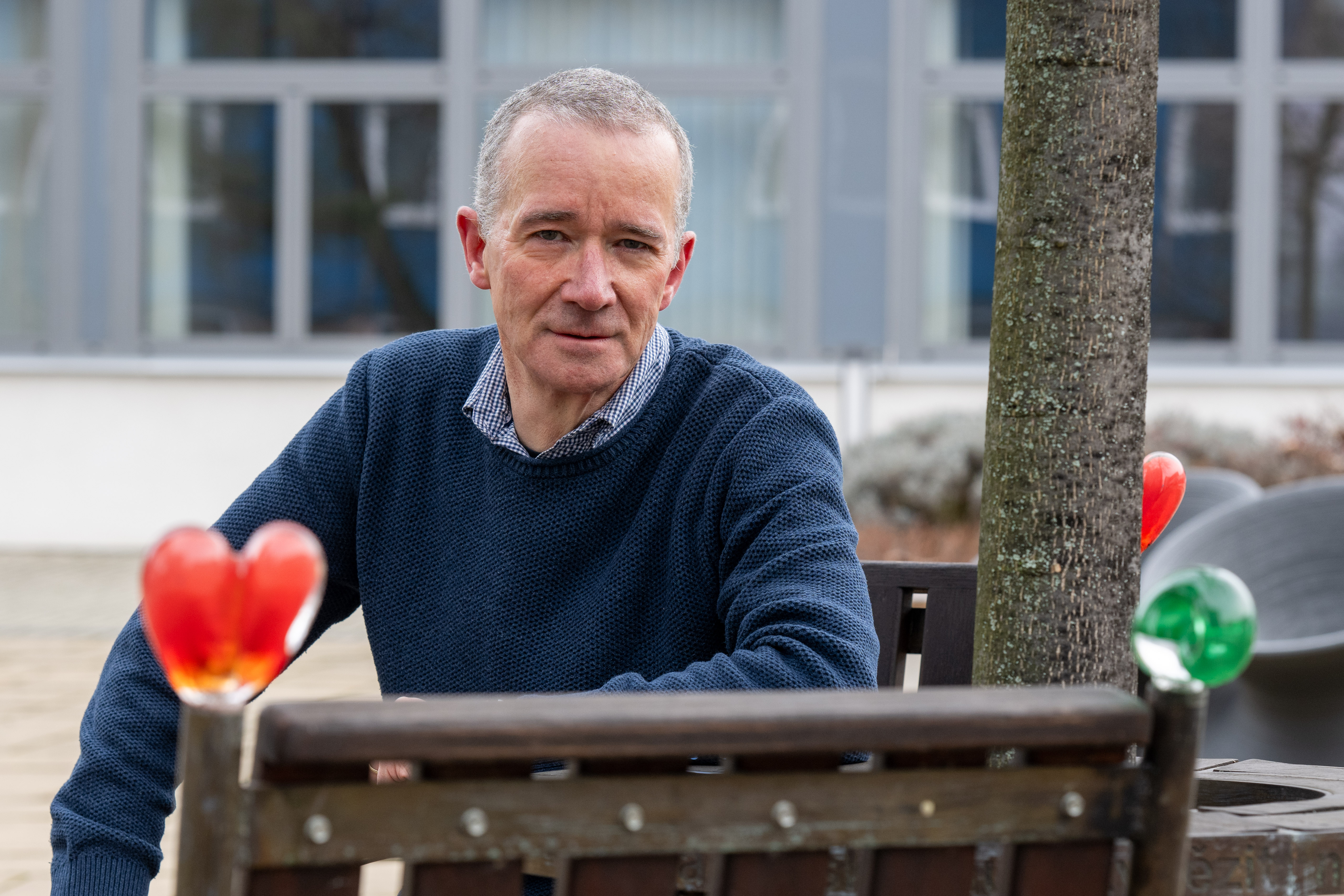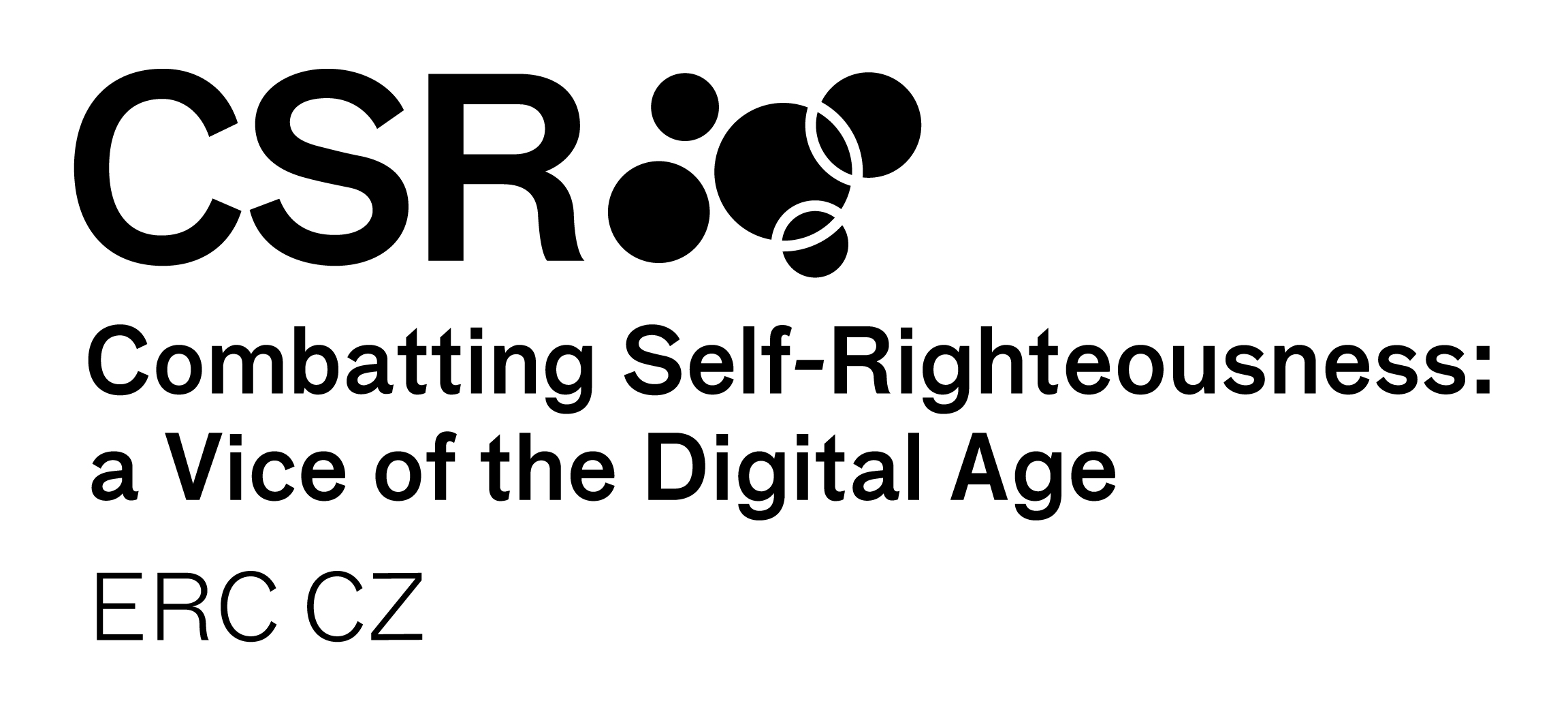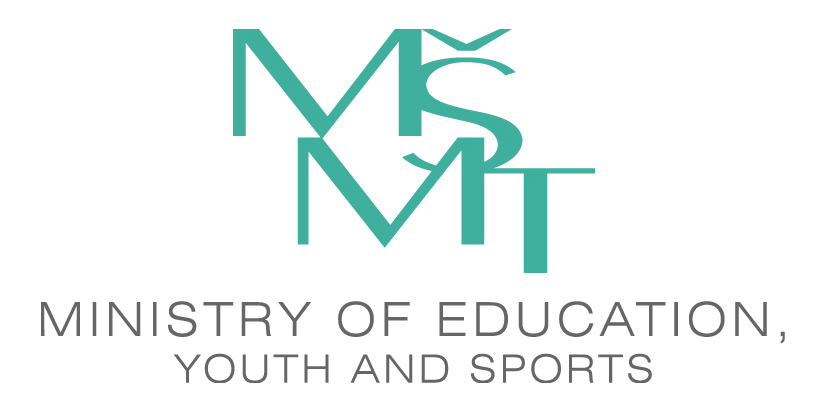Principal investigator: Prof. John Lippitt
Period: 1. 1. 2024 – 31. 12. 2028
ERC CZ Grant No. LL2308 (MŠMT)
Title in Czech: "Morální povýšenost - neřest digitálního věku a její potírání"

____________________________________________
Project description
Self-righteousness has a serious claim to be one of the vices of the digital age. The risks associated with echo chambers and political polarisation involve an ‘us’ and ‘them’ mentality, in which ‘we’ judge ‘them’ as not just mistaken but immoral. Yet despite a burgeoning interest in moral and intellectual virtues and vices in philosophy and related disciplines in recent years, self-righteousness remains no more than a footnote. Drawing on both moral philosophy and the social anthropology/sociology of digital media cultures, this project addresses a serious ethical challenge which threatens our ability to live together in a manner understanding and respectful of diverse opinions. The project’s main objectives are:
- To develop the first comprehensive study of self-righteousness as one of the most significant vices of the digital age, treating it as a vice of both individuals and groups
- To show the relevance of self-righteousness for understanding such phenomena as echo chambers and the forms of anger that fuel polarisation
- To explore how the vice of self-righteousness can be combatted, including proposals to promote the cultivation of countervailing virtues such as greater generosity of spirit in discourse to reduce social divisions.
These objectives will be developed under the following sub-projects:
Sub-project A - A detailed new account of the vice of self-righteousness. Drawing on moral philosophy, religion and literature, this sub-project will explore self-righteousness both as a moral and an epistemic vice, and one to which both individuals and groups are prone. It will explore how self-righteousness is related to – but differs from – vices such as closed-mindedness, intellectual arrogance, hypocrisy, and moralism.
Sub-project B - Self-righteousness and moral criticism in the digital age: anger, activism and polarisation. The importance of sub-project A will be demonstrated by showing its potential to impact upon contemporary debates about pressing social problems such as: epistemic bubbles, echo chambers and their capacity to spread misinformation; moral grandstanding or ‘virtue-signalling’; and the roles of anger in fuelling polarisation. It will investigate the moral psychology of individual and group self-righteousness, exploring how self-righteousness typically fuels anger and blocks compassion, and the implications of this for our engagement with others, online and offline. Critically investigating recent work on the moral value of anger, it will explore what concerns about self-righteousness imply about the nature of moral criticism online, the ethics of social punishment (such as social media naming-and-shaming), and what morally responsible uses and forms of activism would look like.
Sub-project C – Combatting self-righteousness. In considering how the theoretical research of sub-projects A and B can be applied in practice to combat self-righteousness, the project will consider two strategies:
- Cultivating countervailing virtues. What virtues counteract self-righteousness? As well as humility, open-mindedness and forgivingness, the project will pay particular attention to generosity of spirit, a virtue as underexplored as is the vice of self-righteousness. It is anticipated that a fleshed-out account of this virtue will be a vital tool in addressing the problems with which this project is concerned.
- Tackling societal factors. What features of the design and modes of inhabiting digital spaces exacerbate the harms of self-righteousness, and how can these be minimised? This sub-project will address this question by bringing the philosophical work of the other sub-projects into dialogue with work on the social anthropology/sociology of digital media cultures, paying particular attention to the specifics of digital spaces in Central Europe.
____________________________________________
(back)
Team members
Principal investigator: Prof. John Lippitt
Senior research fellow: Dr. Kamila Pacovská (from July 2024)
Senior research fellow: Doc. Tomáš Hejduk
Research fellow (philosophy): Dr. Lesley Jamieson (from September 2025)
Dr. Jake Lehrle-Fry (from September 2024 till February 2025).
Research fellow (social anthropology/sociology): Dr. Alexei Anisin
PhD student (philosophy): Call for applications now closed.
____________________________________________
(back)
Events
- International conference The Ethics of Moral Criticism: Moral Grandstanding, Social Punishment and Beyond, organised by John Lippitt, Alexei Anisin and Kamila Pacovská, 10-12 September, 2025.
- Planned conference on generosity of spirit, moral reflection and compassion stimulation, 2027.
____________________________________________
(back)
Contacts
Principal investigator: Prof. John Lippitt (johnandrew.lippitt@upce.cz)
Deputy PI: Dr. Kamila Pacovská (kamila.pacovska@upce.cz)
Project financial manager: Jana Wagnerová (jana.wagnerova@upce.cz)
____________________________________________
(back)
Job openings
| Name of the position | Application deadline |
| 1. Research fellow (philosophy) - closed | 31 March 2025 |
| 2. PhD scholarship - closed | 30 April 2025 |
1. Research fellow (Moral and/or Social Philosophy)
- Position: Research Fellow
- Duration: 2 years (potentially renewable)
- Number of positions: 1 (full time)
- Disciplines: Philosophy
- Location: Centre for Ethics, University of Pardubice, Czech Republic
- Start date: 1 September 2025 (preferred but negotiable)
You will be employed at the Centre for Ethics as Study in Human Value, University of Pardubice, Czechia, as part of “Combatting self-righteousness: a vice of the digital age” (ERC CZ Grant No. LL2308), a prestigious five-year research project led by Professor John Lippitt. The post is a full-time, research-only position within a small project team of five researchers. The successful applicant will be given academic and administrative support to pursue their research within the broad bounds of the project and the opportunity to participate in the Centre’s lively research environment. In return, they will be expected to make a significant contribution to the project’s publication outputs, including single- and/or co-authored articles in well-regarded international journals, and to help with organising up to two international conferences. We especially welcome candidates who are keen to pursue research on at least one of the following topics:
- moralism
- other vices relevant to self-righteousness (e.g. pride, hypocrisy, closed-mindedness)
- vices and virtues in digital environments
- collective/group vices and virtues
- humility, open-mindedness, love or compassion (insofar as they relate to the project)
- ethical aspects of epistemic/affective bubbles and echo chambers
- moral grandstanding/virtue-signalling
- the ethics of anger and moral protest
- ethical aspects of polarization and moral disagreement
- moral criticism and the ethics of social punishment
Further details of the project may be found here: Self-righteousness | Centre for ethics (upce.cz)
For more information on the advertised position position (including details of documents required) please see: Research Position in Moral/Social Philosophy | EURAXESS or Official advert site
We especially welcome applications from members of underrepresented groups.
Requirements:
- Ph.D. or equivalent, awarded by the intended start date
- track record of independent publications
- research interests relevant to the project topic
- fluency in English.
For further inquiries, contact Prof. John Lippitt (johnandrew.lippitt@upce.cz) or Dr. Kamila Pacovská (kamila.pacovska@upce.cz).
Applications should be sent by March 31st, 2025 to Gabriela Kaufmanová (gabriela.kaufmanova@upce.cz). Please state “Research position, Self-Righteousness Project” in the e-mail subject line.
____________________________________________
(back)
2. PhD scholarship in philosophy - call for applications (deadline 30 April 2025)
- Position: PhD Scholarship
- Duration: 4 years
- Number of positions: 1
- Disciplines: Philosophy
- Location: Centre for Ethics, University of Pardubice, Czech Republic
- Start date: 1 February 2025
- Monthly Stipend: up to 35 000 CZK (approx. 1400 EUR), not subject to tax
“Combatting self-righteousness: a vice of the digital age” (ERC CZ Grant No. LL2308 (MŠMT)) is a prestigious five-year research project led by Professor John Lippitt and based at the Centre for Ethics as Study in Human Value, University of Pardubice. The scholarship here advertised will fund a competitive full-time PhD studentship that will contribute to the goals of this project. The successful applicant will be given academic and administrative support to pursue their research within the bounds of the project and the opportunity to participate in the Centre’s lively PhD community. We especially welcome candidates with a strong academic record who are keen to pursue research on or related to one or more of the following topics:
- vices and virtues in digital environments
- collective/group vices and virtues
- moralism
- other vices relevant to self-righteousness (e.g. pride, hypocrisy, closed-mindedness)
- epistemic/affective bubbles and echo chambers
- moral grandstanding/virtue-signalling
- the ethics of anger
- ethical aspects of polarization
- moral criticism and the ethics of social punishment
Further details of the project may be found here: Self-righteousness | Centre for ethics (upce.cz)
We especially welcome applications from members of underrepresented groups.
Requirements:
- The applicants follow the general Admission requirements to the PhD Programme in Philosophy at the University of Pardubice.
- Please indicate your interest in this position in your Research Proposal and explain how your Research Proposal would contribute to/fit into the project’s themes.
Practical information
- Applicants are strongly encouraged to consult in advance with their prospective supervisor on their Research Proposal, so please contact Professor Lippitt (johnandrew.lippitt@upce.cz)
- The standard length of study is 4 years in the full-time study mode. The project offers a generous monthly stipend for that period provided that all study and project requirements are met.
- The working language of the PhD programme and of the Centre is English and applicants should have a good grasp of academic English. No knowledge of Czech is required.
- The University of Pardubice is located within walking distance from the historical centre of Pardubice, a charming city in the heart of Europe. Pardubice is well connected by train to several major European cities, including Prague (1 hour) and Vienna (3 hours).
Applicants for this position follow the general guidelines for application into the PhD Study at the University of Pardubice. Applications together with all the required documents and application fee should be submitted by 30th April 2025 via Electronic admission application.
For further inquiries, contact Prof. John Lippitt (johnandrew.lippitt@upce.cz) or Dr. Kamila Pacovská (kamila.pacovska@upce.cz).
____________________________________________
(back)



